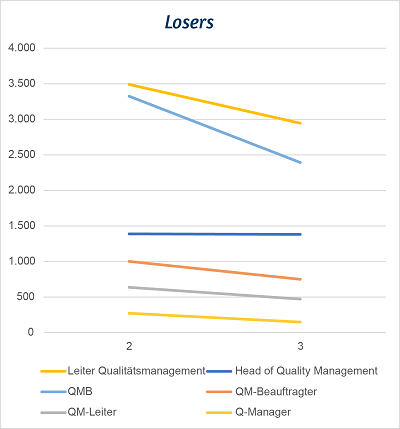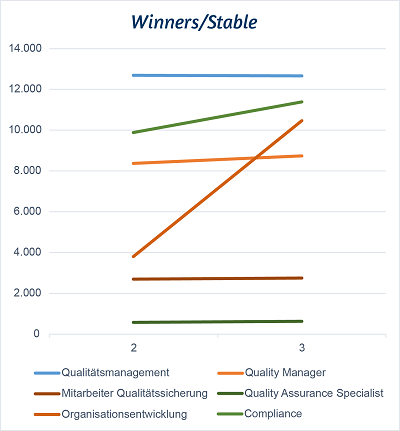The quote found in the title of this study is from Hans Weber, a well-known recruiter in the “Q” sector, and was published in the QZ 9/2019 [1]. This statement sent a jolt through the “Q-munity”. Since then, several other voices within the German Society for Quality (DGQ) have expressed concern that the quality management community is not adapting fast enough to the current challenges of the economy and is therefore increasingly being displaced. As a direct response to the provocative quote, Modell Aachen GmbH began investigating this suspected trend in the form of a Q-occupation study. Clear trends have emerged based on the most recent evaluation of the data in December 2021.
Who Cares?
Professions come and go. It has been that way for thousands of years and will continue to be that way. Professions related to quality also come, go and change. So where is the relevance? To outsiders, the current developments have little significance since the German economy, let alone the global economy, does not depend on Q professions. What is relevant is the question of change and the displacement of Q professions, especially for those who work in this space. For them, the question is whether the current profession has a future, what its value will be, and what professional development opportunities exist. The second group of interested parties are organizations whose customers can be assigned to the Q professions. This is, for example, a German Society for Quality (DGQ) or CAQ software providers such as Babtec GmbH, or Integrated Management System software providers such as Modell Aachen GmbH. In the case of these organizations, the question arises as to whether their community will even exist in the same or similar form in the future. In the case of DGQ, this question is existential; in the case of software providers, there is a good chance that quality data processing and process management will continue to be relevant but will be driven by other professional groups.
Setup of the Study
The Q-profession study conducted by Modell Aachen GmbH uses data from the most popular German professional social media platform, XING. The basic assumption is that XING, with 16 million users in Germany, is a useful representation of the job market. If the number of people working within a set of defined job titles is evaluated over time, clear trends can be identified over the years. The hit lists contain both male and female job titles. It should be noted that the population of people with a profile on XING has also grown over time. The number of members has increased by 10.5% since the beginning of the Q-profession study by Modell Aachen GmbH from July 7, 2019 until December 2021 [2]. Therefore, the growth/shrinkage of the group of a specific job title must therefore be normalized by this 10.5%.
A second less important but nevertheless interesting factor results from the distribution of how large the share of an occupational group is in Germany in relation to the total XING users in the DACH region. Here, there are quite obviously typical German job titles that are completely uncommon in Austria and Switzerland.
The Results - the Losers
The keyword "quality management" (Qualitätsmanagement) has proven to be stable with -0.2% in the normalized observation, and the term "quality manager" has even increased by 4.5% over the last two years. This provides some reassurance that the topic of quality management will not die out over the next few years. The community itself is stable. However, there are losers among the Q professions. Especially relevant are the "QMB" and the "QM representative" (QM-Beauftragte) titles, which have shrunk by 28.1 and 25.2% respectively in two years. In absolute numbers, this means that 900 QMBs have been eliminated in German-speaking countries within two years. This can be explained by the fact that the QMB is no longer explicitly required as a position within the company by ISO 9001. This does not mean that the tasks of the previous QMB have been dropped, but rather the job title is omitted in many places. With linear extrapolation, it can be assumed that this designation will no longer exist in 8 years. If it is also assumed that the job titles on XING are frequently adapted by the respective users with a significant time lag, the extinction of this job title can also take place much more quickly.
“Q-Manager" seemingly falls into the same category, showing the strongest shrinkage of all job titles at 45.6%, although it is not as widely used with originally around 250 hits.
In addition, it is noteworthy that the designations "Head of Quality Management" (Leiter Qualitätsmanagement) and "QM Manager" (QM-Leiter) shrank by 15.7% and 26.0% respectively (together -300 hits) while "Head of Quality" remained quite constant. Particularly in view of Mr. Weber's statements as an expert in the field of Q professions, it can be assumed that the superstructure of quality management is increasingly being dissolved in favor of roles that ensure quality in the specialist areas. In addition, there is a shift toward English designations within job titles.
Other Q-professions that are significantly shrinking are "CIP", "EFQM", "SixSigma" and "TQM", which indicates that these have reached the end of their life cycle. At the same time, their total number was also already very low.

The Results - the Winners

What is striking in the evaluation is that the quality assurance occupational groups are positioning themselves much more strongly. For example, "Quality Assurance Staff" (Mitarbeiter Qualitätssicherung) and "Quality Assurance Specialist" are up 1.8% and 8.7% respectively. There appears to be a trend away from quality management, which is often perceived as rather nebulous, and more toward tangible quality assurance.
The occupational group gaining the most is "Compliance" with 15.2% normative growth in two years. Increasing legal and normative regulations already suggested this trend. It will be exciting to see whether the job description of the compliance manager develops so strongly and comprehensively that QM systems will increasingly be regarded as a subset of compliance in companies in the future. From my perspective, that would be a sad development.
A surprising value is the increase of persons with the job title "organizational development" (Organisationsentwicklung) with a growth of 139%. However, this value seems to be more of an effect from a change in XING's search algorithms. In 2021, all hits with "personnel development" (Personalentwicklung) are also found under "organizational development", so that the result is strongly distorted. However, it should be mentioned here for the sake of completeness.
Finally, there seem to be “typical German” job titles. First and foremost is "QMB" with 98% of German XING users, followed by Information Security Officer (Informationssicherheitsbeauftragter) with 97% and Data Protection Officer (Datenschutzbeauftragter) with 95%. We Germans seem to love “commissioners”. These job titles are virtually non-existent in switzerland and Austria. But "complaints management," (Reklamationsmanagement) "quality engineer" (Qualitätsingenieur) and "quality assurance employee" (Mitarbeiter Qualitätssicherung) also seem to be typical German job titles.
Conclusion
The DGQ can breathe a sigh of relief: the Q-munity as a whole is stable. CAQ manufacturers have a strong target group with strengthened quality assurance roles. EFQM, TQM, CIP and Six Sigma seem to have reached the end of their life cycle, at least as job titles. For QMBs and people who hold or aspire to QM leadership roles, the air is getting thinner. These job titles are shrinking quite a bit. If one follows purely the results of this study, developing the skills of people in these roles in the direction of Compliance, quality assurance or perhaps also organizational development would be a good idea.
For us at Modell Aachen GmbH, the results of this study mean that the job titles that drive the topic of "management systems" in companies are increasingly shifting without the topic losing relevance. On the contrary - according to various studies as well as our own experience, the importance of process-oriented management systems in companies remains high and continues to rise sharply, not least due to the increasing pressure of digitization.
[1] QZ 9/2019 „Raus aus der Komfortzone!“
[2] https://de.statista.com/themen/746/xing/
Are you still looking for the right software for your wiki-based management system? Make your processes more efficient and your company more up-to-date - with the interactive management software Q.wiki!